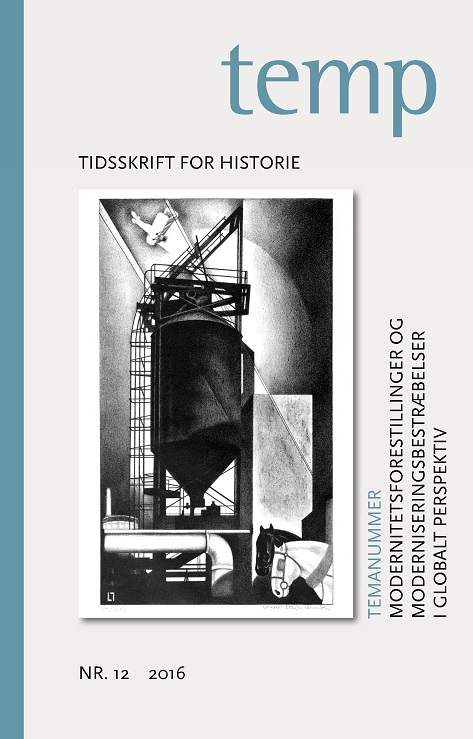MODERNITET, SUBJEKTIVITET OG RELIGION HIZB UT-TAHRIRS FORESTILLINGER OM DEN MODERNE MUSLIM
Nøgleord:
Modernitet, Hizb Ut-Tahrir, islam, religion, governmentalitetResumé
Konstruktion af mennesker som subjekter var det mest centrale aspekt ved moderniteten i Michel Foucaults senere værker. Foucault observerede to forskellige men forbundne former for dannelse af moderne subjekter: dominansteknologier og selvets teknologier – altså eksterne og internaliserede disciplineringsstrategier, og skæringspunktet mellem disse teknologier opfattede han som udgangspunktet for regulering af social adfærd i bred forstand, og han kaldte dette udgangspunkt for styring af moderne individer for governmentalitet. Historisk set har den moderne nationalstat været den centrale aktør for implementeringen af forskellige former for governmentalitet. I dette bidrag argumenterer vi imidlertid for, at ikke-statslige aktører også via moderne governmentalitet former individers subjektivitetsdannelse. Vi giver i artiklen et eksempel på en transnational, islamistisk organisation, Hizb ut-Tahrir, og viser, hvorledes denne kombinerer dominansteknologier med normgivende selvteknologier i ambitionen om at forme nye, moderne muslimske subjektiviteter i forbindelse med deres forestillede, globale kalifat.
Referencer
Arnason, Johann P.: Civilizations in Dispute. Historical Questions and Theoretical Traditions, Leiden: Brill, 2003.
Bröckling, Ulrich, Susanne Krasmann and Thomas Lemke: ‘From Foucault’s Lectures at the Collège de France to Studies of Governmentality. An Introduction.’ , Ulrich Bröckling, Susanne Krasmann and Thomas Lemke (red.): Governmentality. Current Issues and Future Challenges, London and New York: Routledge, 2011, 1-33.
Casanova, José: Public Religions in the Modern World, Chicago: University of Chicago Presss, 1994.
Casanova, José: ‘Civil Society and Religion: Retrospective Reflections on Catholicism and Prospective Reflections on Islam, Social Research 68(4), 2001, 1041-1080.
Commins, David: ‘Hasan al-Banna (1906-1949)’, Ali Rahnema (red.): Pioneers of Islamic Revival, London: Zed books, 2005, 125-153.
Dean, Mitchell: ‘A Social Structure of Many Souls’, Moral Regulation, Government, and Self-Formation’, The Canadian Journal of Sociology 19 (2), 1994, 145-168.
Duara, Prasenjit: Sovereignty and Authenticity: Manchukuo and the East Asian Modern, Lanham and Oxford: Rowman & Littlefield, 2004.
Eisenstadt, Shmuel N.: ‘Multiple Modernities’, Daedalus 129(1), 2000, 1-29.
Eisenstadt, Shmuel N.: ‘The Civilizational Dimension of Modernity: Modernity as a Distinct Civilization’, International Sociology 16 (3), 2001, 320-340.
Elias, Norbert: The Civilizing Process. The History of Manners and State Formation and Civilization, Oxford: Basil Blackwell, 1994.
Ferrara, Alessandro: Modernity and Authenticity. A Study of the Social and Ethical Thought of Jean-Jacques Rousseau, Albany: State University of New York Press, 1993.
Foucault, Michel: ‘About the Beginning of the Hermeneutics of the Self’, Jeremy R. Carrette (red.): Religion and Culture by Michel Foucault, Manchester: Manchester University Press, 1980.
Foucault, Michel: ‘What is Enlightenment’, Paul Rabinow (red.): The Foucault Reader, Pantheon Books: New York, 1984, 32-51.
Foucault, Michel: The Use of Pleasure, New York: Vintage Books, 1990.
Foucault, Michel: Discipline & Punish: The Birth of the Prison, New York: Vintage Book, 1995.
Hee, Mohammad: Afhopperen – Seks år I Hizb ut-Tahrir, København: Jyllands-Postens Forlag, 2008.
Jung et al: Politics of Modern Muslim Subjectivities. Islam, Youth, and Social Activisim in the Middle East, New York and London: Palgrave, 2014.
Jung, Dietrich og Kirstine Sinclair: ‘Multiple Modernities, Modern Subjectivities and Social Order: Unity and Difference in the Rise of Islamic Modernities.’ Thesis Eleven 130 (1), 2015, 22-42.
Mitchell, Richard P.: The Society of the Muslim Brothers, London: Oxford University Press, 1969.
Osman, Mohamed Nawab: ‘Reviving the Caliphate in the Nusantara: Hizb ut Tahrir
Indonesia's Mobilization Strategy and Its Impact in Indonesia’, Terrorism and Political Violence, 22: 4, 2010, 601-622.
Shepard, William E.: ‘Islam and Ideology: Towards a Typology’, International Journal of Middle East Studies, 19, 1987, 307-336.
Sinclair, Kirstine: The Caliphate as Homeland: Hizb ut-Tahrir in Denmark and Britain, University of Southern Denmark, Unpublished PhD Thesis, 2010.
Taji-Farouki, Suha: ‘Islamic Discourse and Modern Political Methods: An Analysis of al-Nabhani’s Reading of the Canonical Textual Sources of Islam’, American Journal of Islamic Social Sciences, 11: 3 (1994), 1994, 365-39.
Taji-Farouki, Suha: A Fundamental Quest: Hizb al-Tahrir and the Search for the Islamic Caliphate, London: Grey Seal, 1996.
Taylor, Charles: A Secular Age, Cambridge, MA: The Belknap Press of Harvard University Press, 2007.
Downloads
Publiceret
Citation/Eksport
Nummer
Sektion
Licens
Copyright temp - tidsskrift for historie og forfatterne.
Artikler publiceret i Temp må citeres, downloades og videresendes for ikke-kommerciel brug, under forudsætning af normal akademisk reference til forfatter(e) samt tidsskrift, årgang, nummer og sider. Artiklerne må kun genudgives med eksplicit tilladelse fra forfatter(e) og tidsskriftet.





